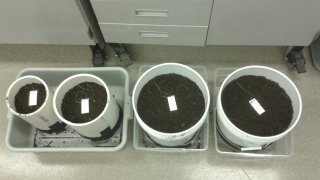Emergency Response Research Webinar Series

Free webinars typically held on the second Wednesday of the month. Special webinars on COVID-19 research are conducted as research results become available.
EPA's Office of Research and Development hosts this webinar series to share current research activities and results. This webinar series covers the latest information on research supporting EPA's response to chemical, biological, and radiological incidents, as well as natural disasters. This forum allows EPA to communicate directly with partners and stakeholders to foster collaboration and dissemination of information.
NOTE: Attendees have the option of receiving a certificate of attendance. Acceptance of certificates is contingent on organization requirements—EPA cannot guarantee acceptance. Closed-captioned recordings of the webinars are provided below for later viewing and as a training resource; certificates cannot be provided for viewing webinar recordings.
Webinar dates and topics are subject to change.
On this page:
Upcoming Webinar
Cleaning Up Soil Contaminated with Pathogens

Wednesday, February 12, 2025, 2:00 - 3:00 PM ET
Soil may become contaminated with Bacillus anthracis spores, the bacterium causing anthrax disease, after their intentional release into the outdoor environment. Soil may also become contaminated with B. anthracis spores from animal carcasses that have died from the disease. Other pathogens may contaminate soil as well. Decontaminating the soil on-site would help minimize spread of the bio-contaminant. Emergency responders may face challenges in cleaning up soil as decontaminants prove less effective with depth and the more organic material (from decaying plants or other biomass) present in the soil.
This presentation will provide an overview of current research findings and technology available for sterilizing soil on-site. Information on soil treatment options that have been evaluated in the lab or in the field will be discussed, in terms of how well they work and how the decontaminant may be applied to the soil. Some background material on related issues, such as how far pathogens may disperse in the soil or how long they may survive in soil will also be presented.
About the Presenters

Joseph Wood is a Senior Research Engineer with EPA's Office of Research and Development, in the Homeland Security and Materials Management Division. He has been with the EPA since 1991 and has been conducting decontamination and waste treatment and disposal related research since 2004. His research primarily involves the testing, evaluation, and development of technologies that can be used to decontaminate materials and environmental matrices contaminated with biological agents. He is the primary author or co-author for 40 peer-reviewed journal articles and over 90 EPA published reports. He holds a master's degree in Environmental Engineering from the University of Illinois (Urbana-Champaign) and is a licensed professional engineer.

Shannon Serre is currently with the EPA's Office of Emergency Management working in the Chemical, Biological, Radiological, and Nuclear Consequence Management Advisory Team. He is focused on the response and recovery from a chemical, biological, or radiological incident. He has been involved in several field-scale projects including: the Bio-response Operational Testing and Evaluation (BOTE) project, Underground Transport Restoration (UTR) project, Operational Test and Evaluation of Chemical Remediation Technologies (OTECRA) project and is now involved with the Analysis for Coastal Operational Resiliency (AnCOR) project. Shannon has a Ph.D. in Chemical Engineering from the University of Utah.
2025 Schedule
If you are interested in being notified when new webinars are scheduled, please sign up to receive email notifications here: Receive emails for upcoming webinars.
Topic and presenters are subject to change. Additional information and registration links will be provided in advance of each webinar.
| Date | Topic |
|---|---|
| February 12 | Biological Decontamination |
| March 12 |
Drinking Water Decontamination |
| April 9 | SWMM for Emergency Response Planning |
| May 14 | Mobile Hot Zone Decontamination Cart |
| June 11 | Emerging Technologies for Responder Training |
| July 9 | Foreign Animal Disease Outbreak |
| August 13 | Emergency Response Support from EPA |
| September 10 | 20 Years After Hurricane Katrina |
| November 12 | Aerosol Treatment Testing Capability |
| December 10 | Lithium Ion Batteries |
Past Webinars
Recordings and other materials from past webinars are available below. Recordings are hosted on EPA's YouTube channel. Certificates cannot be provided for watching the webinar recordings.
2024 Webinars
| Date | Topic and Presenter(s) |
|---|---|
| December 11, 2024 |
Local Partnerships: Developing Solutions for Rapid Needs |
| November 13, 2024 |
Protective Actions & Decontamination: Radiological Incident Response |
| October 9, 2024 |
EPA's Water Security Test Bed: Critical Infrastructure Research |
| September 11, 2024 | Wildfire Impacts on Water Infrastructure Presenters: William Platten, Office of Water; Samantha Bishop, EPA Region 9; Levi Haupert, Office of Research and Development |
| August 14, 2024 | Testing Chemical Warfare Agent Response in a Realistic Setting Presenters: Lukas Oudejans, Office of Research and Development; Shannon Serre, Office of Land and Emergency Management; James Justice, EPA Region 5 |
| July 10, 2024 | Clean Water Access During Emergencies Presenters: James Goodrich, Office of Research and Development and Dave Carney, Kentucky's Department for Public Health |
| June 12, 2024 | EPA's Wind Tunnel: Modeling Urban Wind Flow & Dispersion Presenter: Michael Pirhalla, Office of Research and Development |
| May 8, 2024 | Pathogen Contaminated Wastewater: Where Does it Go & How to Treat it Presenter: Adam Burdsall, Office of Research and Development |
| April 10, 2024 | Oil Spill Response: Advances in Detection Capabilities Presenter: Robyn Conmy, Office of Research and Development |
| February 14, 2024 | Protecting Drinking Water Sources with EPA's River Spill Model Presenters: James Goodrich, Office of Research and Development and Sam Dinkins, Ohio River Valley Water Sanitation Commission |
More Webinars
Special Topics
Cleanup, Remediation & Decontamination
- Toxic Aromatherapy: A Melioidosis Mystery (2023)
- Fentanyl Decontamination (2023)
- Clean or Replace? Decontaminating PFAS from Firefighting Equipment and Hangars (2022)
- Considering Trade-offs in Contamination Cleanup (2022)
- Readily Available Equipment for Response and Recovery (2021)
- Neutralization and Attenuation of Ricin Toxin (2019)
- Decontamination Strategy and Technology Selection Tool (DeconST) (2014)
- Remediation of Soils Contaminated with Bacillus anthracis Spores (2014)
Large Scale Demos
- Analysis for Coastal Operational Resiliency (AnCOR)-Wide Area Demonstration (2023)
- Underground Transportation Restoration Research (2018)
- Responding to a Chemical Warfare Incident: From Sampling and Analysis to Decontamination and Waste Management (2017)
Community Resilience & Social Science
- Equitable Resilience Builder (2023)
- Building Relationships and Trust in Contamination Cleanup (2023)
- Environmental Resilience Tools Wizard (2021)
- Promoting Community Resilience through Social Science (2021)
Sampling & Analysis
- Innovative Sampling for Large-Scale Biological Outdoor Contaminated Events (2023)
- Facilitating Coordinated Response from Field to Lab: the Environmental Sampling and Analysis Methods (ESAM) Program (2022)
- Biothreat Agent Detection: Advances in Rapid Analytical Methods (2021)
- Virtual Reality: A Training Tool for Biological Sampling (2020)
- EPA's Environmental Sampling and Analytical Methods for Environmental Remediation and Recovery (2018)
- Water Security and Resiliency (2018)
- USGS/EPA Collaboration: Bacillus anthracis in American Soils: From Sample Collection to Data Application (2014)
COVID-19 Research
- COVID-19: Evaluating Aerosol Treatment Technologies (2022)
- COVID-19: Aerosol Treatment Devices & Ozone Disinfection (2021)
- COVID-19: Electrostatic Sprayers and Foggers for Disinfectant Application (2021)
- Reducing Environmental Exposure to SARS-CoV-2: An Overview of Findings (2021)
- COVID-19: Cleaning & Disinfecting of PPE for Effective Reuse (2021)
- COVID-19: UV-C Devices and Methods for Surface Disinfection (2021)
- COVID-19 Long Lasting Disinfectants (2020)
- EPA Expands Research on COVID-19 in the Environment (2020)
Oil Spills
Waste Management
- Incident Waste Decision Support Tool (I-WASTE) Training (2024)
- Waste Estimation Case Studies to Support Planning for Natural and Manmade Disasters (2023)
- Pre-Incident Planning for CBRN Waste Management (2022)
- Incident Waste Decision Support Tool (I-WASTE) (2020)
Data Management
Wildfires and Natural Disasters
- Underground Storage Tanks: Preparing and Responding to Extreme Events (2022)
- Remediating Premise Plumbing Following a Water Emergency or Disaster (2022)
Water Security
- Tools, Training and Technical Assistance to Increase Water System Resilience (2024)
- Cybersecurity (2023)
- Building Resiliency: Emergency Water Treatment System (2021)
- Water Network Tool for Resilience (2020)
- Removal of Organic Contaminants from Polyethylene Drinking Water Pipes by Flushing (2018)
- Premise Plumbing Research in EPA's Homeland Security Research Program (2018)
- Water Security and Resiliency (2017)
- EPA's Water Security Test Bed (2015)
- TEVA-SPOT Consequence Evaluation Module and EPA-RTX (2014)
